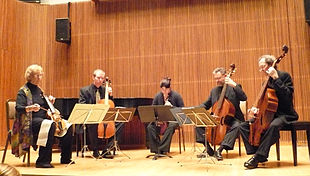- Consort of instruments
-
A consort of instruments was a phrase used in England during the sixteenth and seventeenth centuries to indicate an instrumental ensemble. These could be of the same or a variety of instruments. Consort music enjoyed considerable popularity at court and in households of the wealthy in the Elizabethan era and many pieces were written for consorts by the major composers of the period. In the Baroque era consort music was absorbed into Chamber music.
Contents
Definitions and forms
The earliest documented example of the English word 'consort' in a musical sense is in George Gascoigne’s The Princelye Pleasures (1576).[1] Only from the mid-seventeenth century has there been a clear distinction made between a 'whole' consort, that is, all instruments of the same family (for example, a set of viols played together) and a 'mixed' or 'broken' consort, consisting of instruments from various families (for example viols and lute).[2]
Major forms of music composed for consorts included: fantasias, cantus firmus settings (including In nomines), variations, dances or ayres, and fantasia-suites.[3]
Major composers
Composers of consort music during the Elizabethan era include John Dowland, Anthony Holborne, and William Byrd. The principal Jacobean era composers included Thomas Lupo, Orlando Gibbons, John Coprario, and Alfonso Ferrabosco. Later seventeenth-century composers included Christopher Simpson, William Lawes, Matthew Locke, and Henry Purcell.
Modern consorts
In modern times, a number of ensembles have adopted the term Consort in their names, such as the Jaye Consort, the Morley Consort, the Early Music Consort of London, the Purcell Consort of Voices, the Consort of Voices,[4] the Quadriga Consort, the Locke Brass Consort, and the Rose Consort of Viols.[5]
See also
Notes
- ^ Warwick Edwards, "Consort", The New Grove Dictionary of Music and Musicians, edited by Stanley Sadie and John Tyrrell (New York: Grove's Dictionaries, 2001).
- ^ David D. Boyden, "When Is a Concerto Not a Concerto?" (Subscription Access), The Musical Quarterly 43, no. 2 (April 1957): 220–32 (citation on pp. 228–29); S. Sadie and Alison Latham, The Cambridge Music Guide (Cambridge University Press, 1990), p. 136; P. Holman. Four and Twenty Fiddlers: The Violin at the English Court, 1540-1690 (Oxford University Press, 1996), p. 275.
- ^ J. H. Baron, Chamber Music: A Research and Information Guide, 2nd revised edition (London and New York: Routledge, 2002), p. 133. ISBN 0-415-93736-1
- ^ http://www.cov.org.uk/ Consort of Voices.
- ^ http://www.roseconsort.co.uk/ Rose Consort of Viols.
External links
- Video of consort of viols
- Robins, Brian. "The English Viol Consort in the Tudor Era"
- 2008 Viol Extravaganza Collection of viol consort videos (YouTube)
Categories:- Early music consorts
- Instrumental early music groups
Wikimedia Foundation. 2010.

